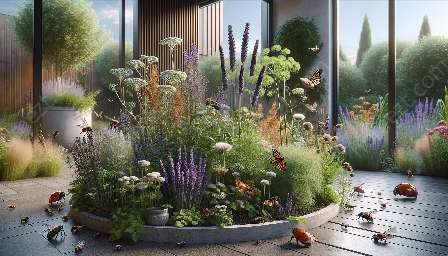Herb gardens are not just a source of culinary and medicinal plants; they can also be a natural haven for pest control. Through the use of herbs, you can effectively protect your garden from unwanted pests without resorting to harmful chemicals. This comprehensive guide will explore the numerous benefits of using herbs for natural pest control, and provide valuable insights for integrating this approach into your gardening and landscaping endeavors.
Understanding the Importance of Natural Pest Control
Conventional pest control methods often involve the use of synthetic chemicals that can have detrimental effects on the environment, beneficial insects, and even human health. In contrast, natural pest control methods offer a sustainable and ecological approach to managing pest populations in gardens. By harnessing the power of herbs, you can enhance the resilience of your garden ecosystem while preserving its biodiversity.
Advantages of Using Herbs for Pest Control
1. Biodegradable and Non-Toxic: Herbs offer a safe and eco-friendly alternative to chemical pesticides. They break down naturally and do not leave harmful residues in the soil or water.
2. Multi-Purpose Functionality: Many herbs serve dual roles as pest repellents and valuable additions to your culinary or medicinal collection. This multifaceted use adds value to your garden while promoting a harmonious coexistence of plants and pests.
3. Cost-Effective Solution: Growing pest-repelling herbs can significantly reduce the need for purchasing commercial pesticides, thereby saving you money in the long run.
Recommended Herbs for Natural Pest Control
Several herbs are renowned for their abilities to repel or deter common garden pests. By strategically planting these herbs, you can create a natural barrier against unwanted intruders.
1. Chives (Allium schoenoprasum)
Chives emit a strong odor that can deter pests such as aphids, Japanese beetles, and carrot rust flies. Their pungent aroma also offers protection to nearby plants, making them an ideal addition to herb gardens and vegetable patches.
2. Basil (Ocimum basilicum)
Basil contains essential oils that are effective in repelling mosquitoes, flies, and spider mites. Planting basil alongside tomatoes can help protect the tomato plants from hornworms and whiteflies.
3. Rosemary (Rosmarinus officinalis)
The fragrance of rosemary can repel cabbage moths, carrot flies, and slugs, making it a valuable ally in the fight against garden pests.
4. Lavender (Lavandula spp.)
Lavender's aromatic properties make it an excellent deterrent for fleas, moths, and mice. Its ornamental value and insect-repelling qualities make it an attractive addition to any garden.
Integrating Herb Gardens and Natural Pest Control
Companion Planting: Create synergistic planting arrangements by strategically placing pest-repelling herbs alongside susceptible plants. This approach can discourage pests without disrupting the natural balance of your garden.
Herb-Derived Sprays: Utilize the natural oils and essence from herbs to create homemade insect-repelling sprays. By infusing these natural solutions with water, you can effectively deter pests without harming beneficial insects.
Maintaining a Sustainable Garden Ecosystem
Embracing natural pest control methods not only protects your plants but also fosters a healthy and robust garden ecosystem. By reducing reliance on chemical pesticides, you can attract beneficial insects, such as pollinators and predators, which play a vital role in maintaining ecological balance.
Conclusion
Herb gardens offer an abundance of natural solutions for pest control, enriching your gardening experience while promoting environmental sustainability. By leveraging the power of herbs, you can establish a harmonious and thriving garden that remains resilient against pests and supportive of beneficial wildlife. Embrace the bountiful potential of herbs for natural pest control and cultivate a garden that flourishes in harmony with nature.




































